Introduction
- Industrial/organizational psychology is a field that applies psychology principles to the workplace.
- It can be used to solve issues that occur in the organizational context.
- As a practicing I/O psychologist, I will make use of I/O psychology to effectively address the current event in this organization.
- Rucci (2008) states that the purpose of I/O psychology is to “enhance the dignity and performance of human beings, and the organizations they work in, by advancing the science and knowledge of human behavior” (p.17).
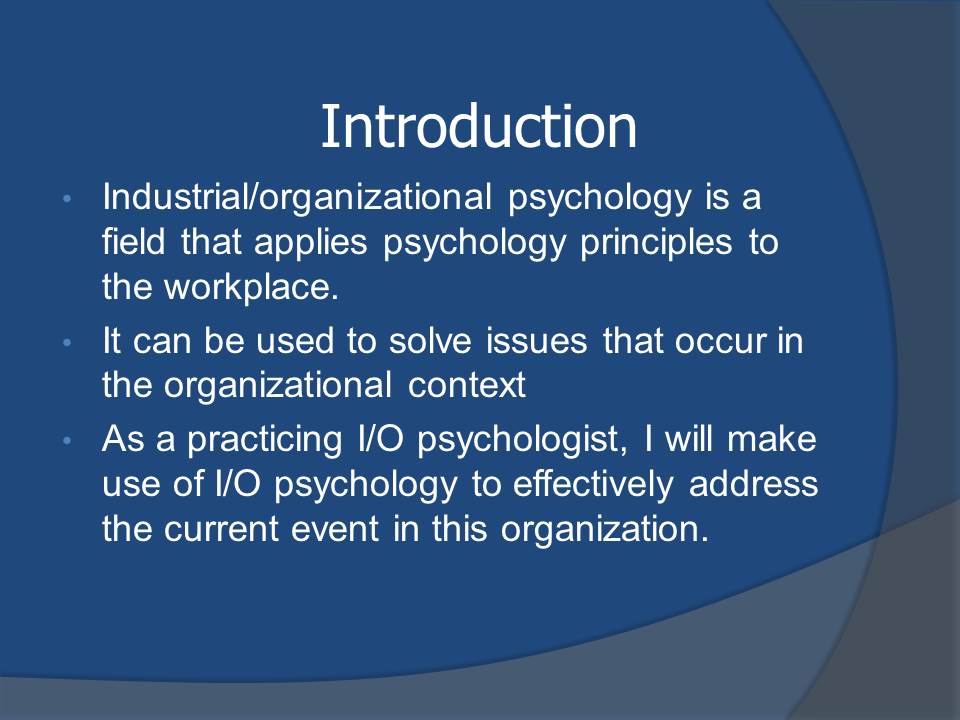
Current Event
- The current event involves problems caused by organizational changes.
- Many employees are finding it hard to make a smooth transition and there have been many cases of resistance.
- This resistance has reduced organizational productivity.
- An I/O psychologist, I will come up with ways to assist in the transition.
Organizations are being forced to make changes in order to adapt to the environment within which they operate.
The process of change and transition is at best hard for many organizations since the employees are used to the old ways of doing things. O/I psychology assists in transitions since it facilitates smooth changes by helping the employees adapt favorably to the new conditions.
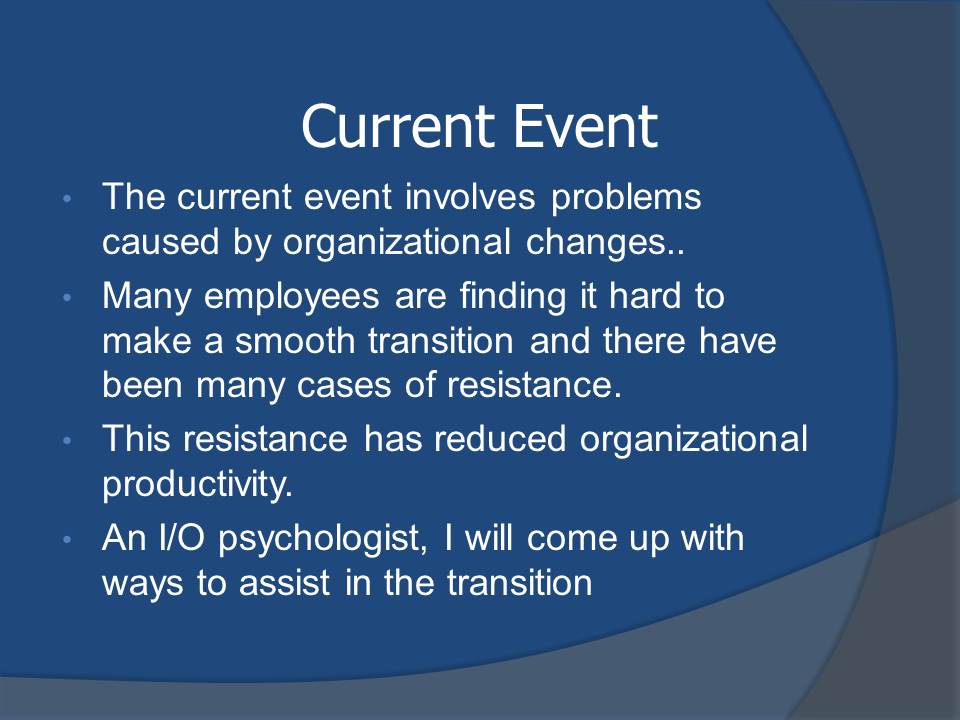
Benefits of Using an I/O Psychologist
- I/O psychologists seek to improve the overall performance of the organization through studying human behavior in the workplace.
- I/O psychology examines real factors that affect the individuals working in the organization.
- Areas where productivity is being hampered or where improvements can be made are identified.
- The I/O psychologist acts as a scientist by conducing research into the issues that the organization faces. This professional then applies the findings on an organization in order to enhance its effectiveness.
- The I/O psychologist engages in performance improvement interventions which are aimed at increasing productivity
- Practical solutions are proposed to help the organization.
- The success of the solutions can in most cases be quantified
- I/O psychologists assist in motivating the work force.
- I/O psychology examines real factors that affect the individuals working in the organization. From this exploration, problems can be identified and appropriate solutions proposed.
- The I/O psychologist is adept at identifying motivational factors that can be used to steer employees to greater performance. This is importance since for organizations to achieve their goals of increased productivity, the employees need to be motivated to accomplish desired goals.
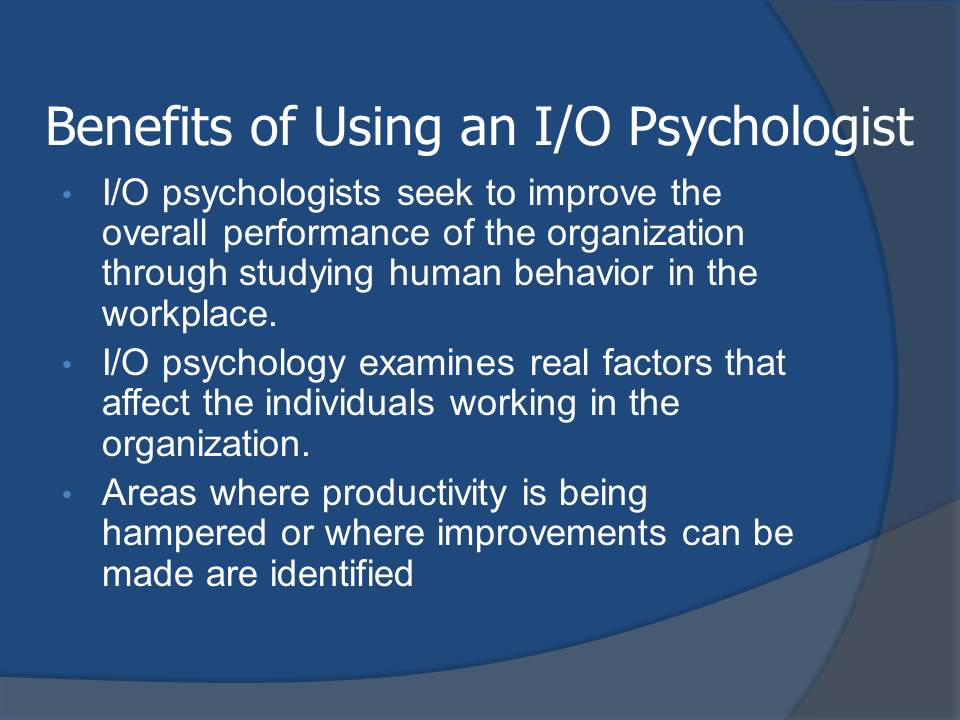
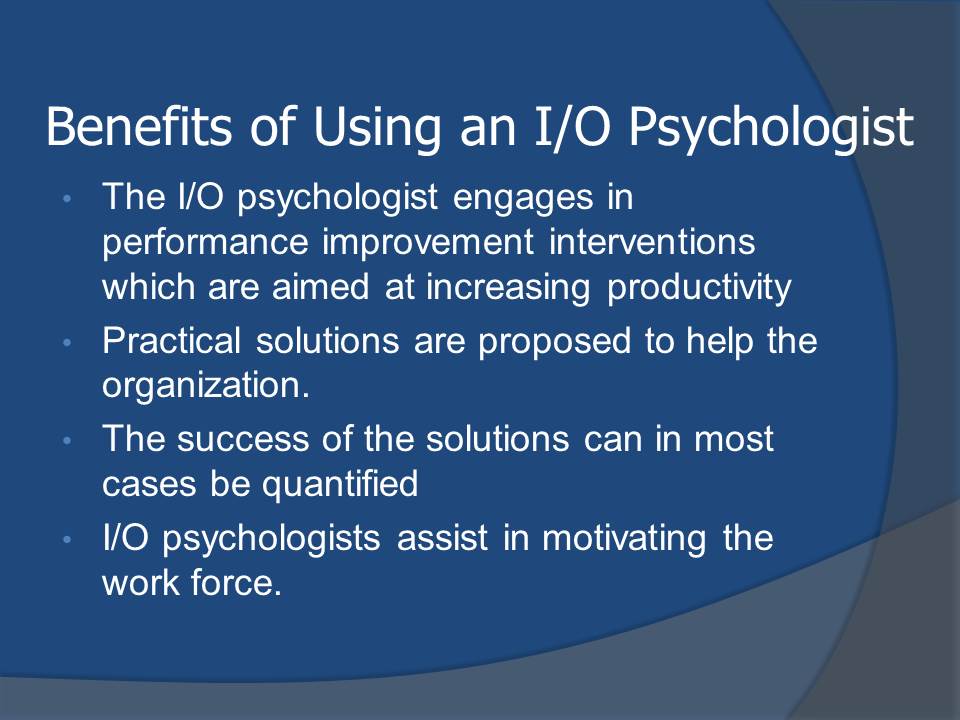
Rectifying the Current Issue
- Help the employees to accept change.
- Involve the employees in the change process by considering their needs.
- Help employees to spend their energy trying to solve problems and make the new system work instead of resisting change.
- Research indicates that employees are more likely to embrace change if they understand the reason behind it. Employees are least likely to accept change if they don’t understand or are not told the reasons behind the change.
- The manner in which change is implemented influences acceptance. Proper communication will ensure that the employees are kept in light of what is going on.
- Aamodt (2010) observes that it is natural for people faced with a new situation to be resistant to change and engage in wasteful habits such as complaining and trying to sabotage the new ways of doing things.
- As an I/O psychologist, I will help the employees to avoid this pitfall and instead channel their energies to adopting the new system.
- Ensure that the organization has the right personnel for the change.
- Make provision for training needs that may be necessitated by the changes.
- Take initiatives to enable those affected by the change to recognize gaps in their own competence and take steps to learn new skills required for success.
- Help remove the stress associated with change.
- Change brings about stress as workers may be required to learn new skills or deal with extra work loads. Coming up with ways to remove this stress will be beneficial to the change process.
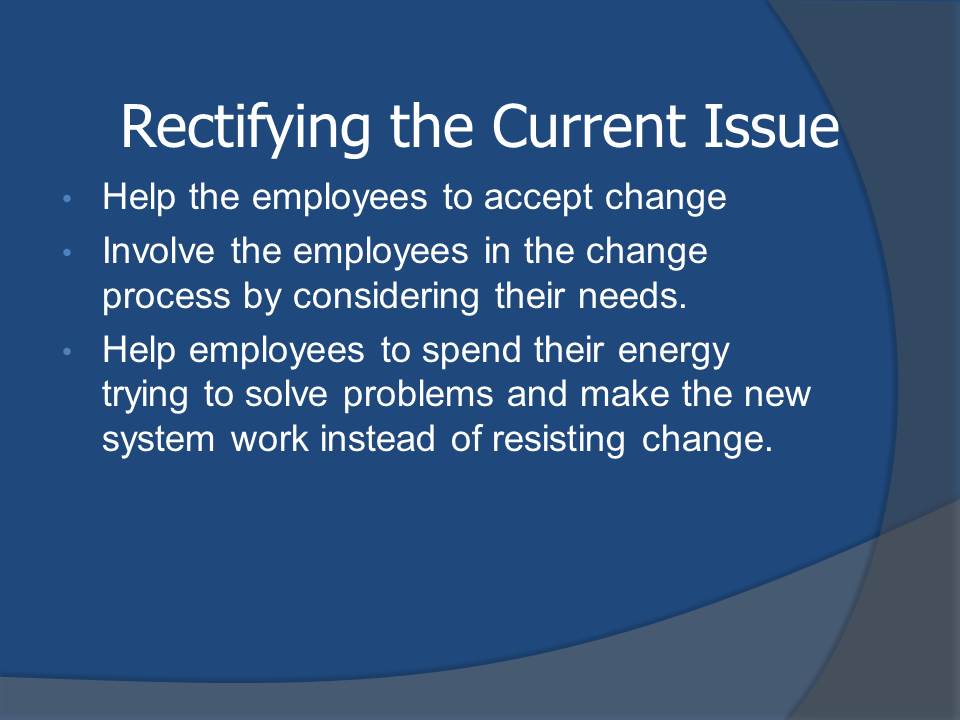
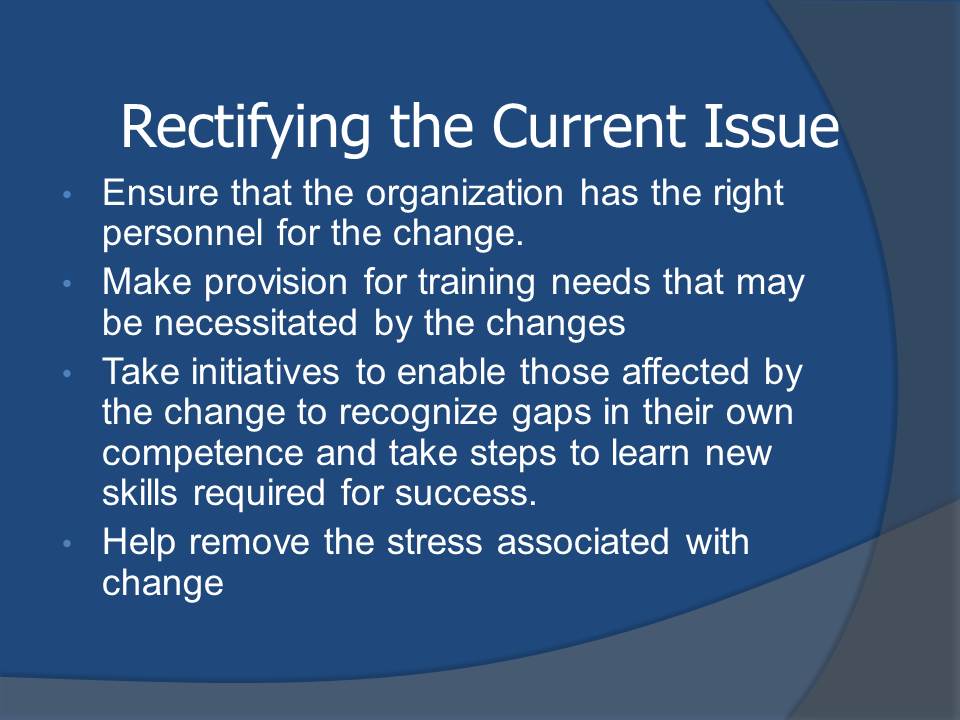
Theories Used to analyze event
- Two I/O psychology theories will be applicable in the current event.
- The first is the Psychological contract theory.
- The theory is applicable since changes offset the existing psychological contract between employee and employer.
- This theory will explain why there is resistance to change by the employees.
- The Psychological contract theory will also be relevant in managing change. This theory addresses the relationship that exists between the employer and employees. It addresses the mutual expectations that each party has on the other.
- Change affects the psychological contract since it may result in different input by the employee. The organization must consider the question “what will be the impact of change on the psychological contract with employees?“
- The second theory used is Skinner’s theory of operant conditioning.
- Research indicates that motivation is integral to the success of the change process.
- The Operand conditioning theory will establish the need for motivation.
- Positive reinforcement will be applied to encourage the adoption of new practices.
- Motivational theories would also be employed in the situation since employees need to be given incentives to adopt the changes. Holbeche (2012) observes that in managing change situations, leaders and managers will be required to offer positive reinforcement even more than in routine situations.
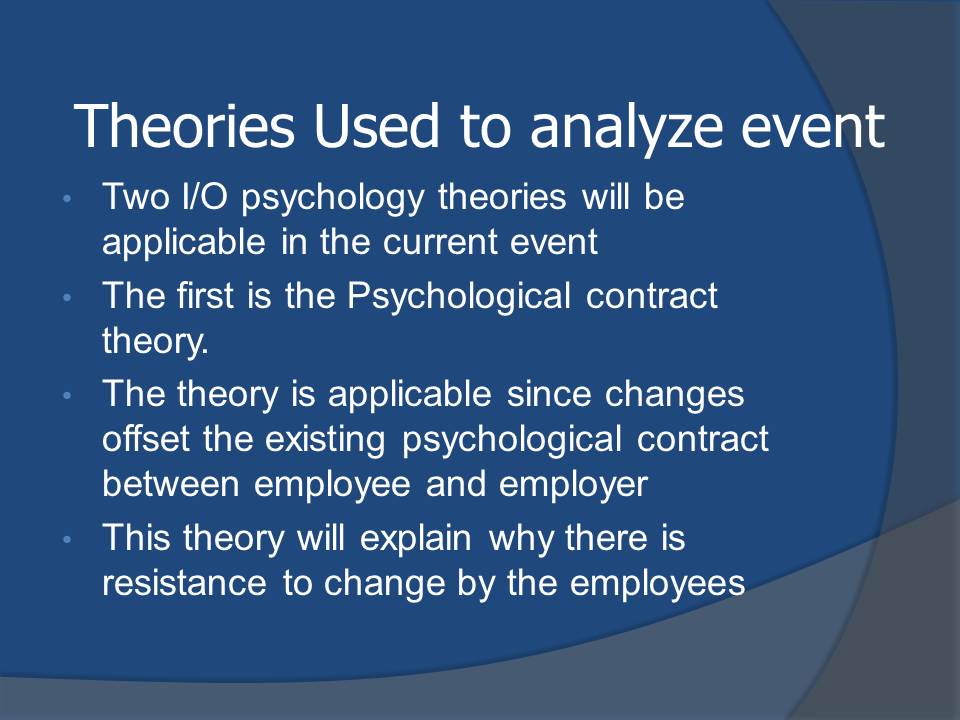
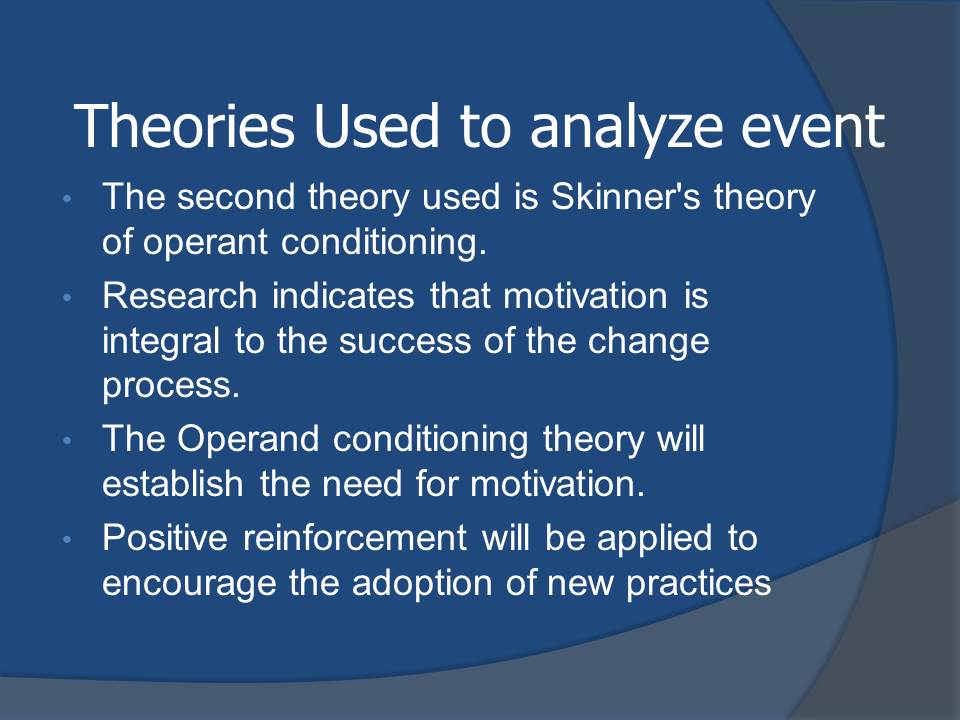
My Course of Action
- I would help management communicate the vision of what the future will look like and how the employees will fit into it in order to reduce anxiety or powerlessness.
- I would tackle resistance by helping the managers communicate a clear vision for the employees.
- Set a timetable for the change process.
- Changes bring about uncertainty and it is therefore important for the employees to be reassured. This reassurance can be done by giving the employees details as to why the change is taking place and how it will affect them.
- Aamodt (2010) states that Employees are most responsive to change when they are kept well informed
- A clear vision is important since it shows employees what the future will look like and how they will fit in.
- Set a timetable for the change process. Holbeche (2012) notes that the longer the change process takes the greater the likelihood of employees becoming disillusioned.
- Coaching and counseling programs will be provided to assist individuals in organizaitonal change.
- Get training needs from employees and ensure that provisions have been made to deal with them.
- Establish a set of objectives and goals for employees.
- Seek feedback from employees on their experiences.
- Most employees are scared of change since they do not have the relevant skills required by the new system. Having a training system in place will help alleviate this fear and therefore assist in smooth transition.
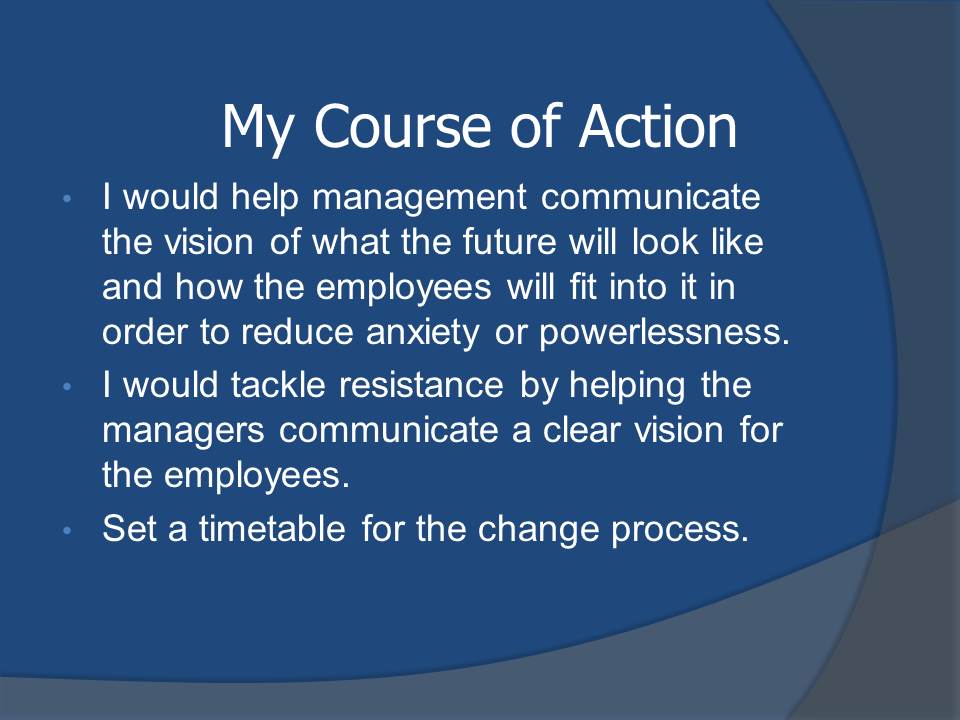
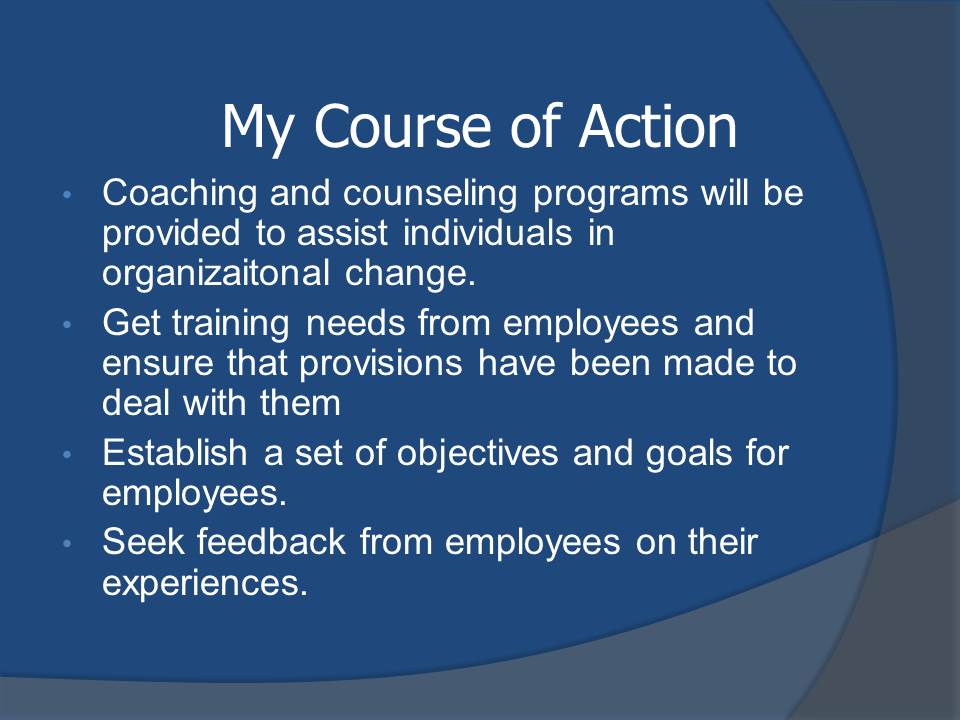
How Theories would help Prevent negative outcomes
- Psychological Contract Theory will help highlight the favorable conditions in the new system for the employees.
- The theory will also help to create the proper atmosphere for change.
- The theory will help identify the emotional impact of change and address them.
- Changes may require the employee to come up with a new psychological contract. It is important for the individual to integrate their individual improvement objectives with organization change goals (Burke, 2010).
- Skinner’s theory of operant conditioning will help come up with incentives to engage in new organizational behavior.
- Employees will be motivated to achieve the objectives required by the new system by linking rewards to certain objectives.
- The theory places emphasis on positive reinforcement to encourage behavior change. Skinner believed that punishment had limited value in changing behavior and was an undesirable way to modify behavior.
- An important consideration is that the link between the behavior and the reward has to be clear.
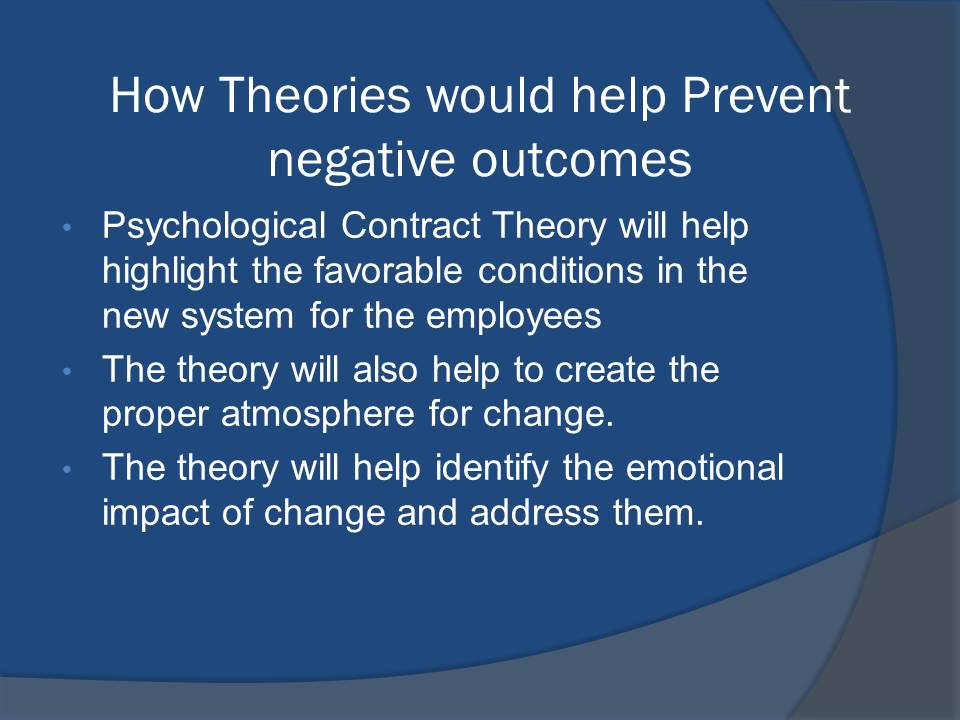
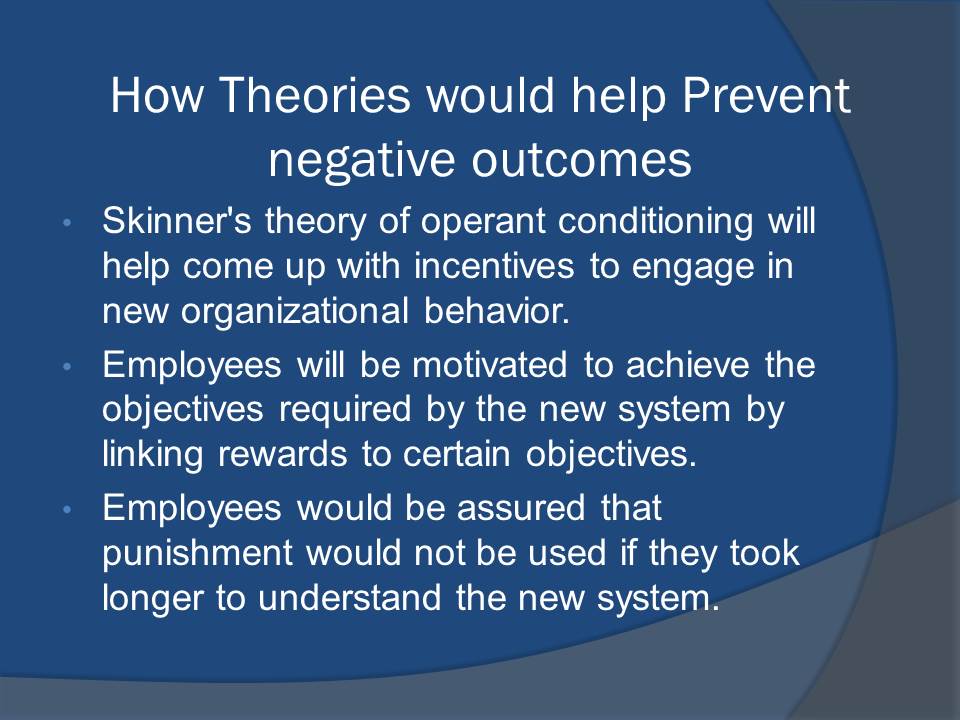
Evaluating Effectiveness of proposal
- The effectiveness of the proposed solution could be measured through survey feedback.
- A survey could be used to measure employee attitudes or perceptions concerning the new working conditions.
- Measuring employee performance in order to justify motivational technique employed.
- In order for the proposed solutions to be justified, it is important for them to result in positive outcomes.
- Being able to quantify the outcomes of my proposals will help to show if they were successful.
- Survey feedbacks will enable the organization to measure the attitudes and perceptions of the employees. A positive score will underscore the effectiveness of my proposals.
- The overall performance of the employees will also be measured in order to justify the motivational tactics proposed.
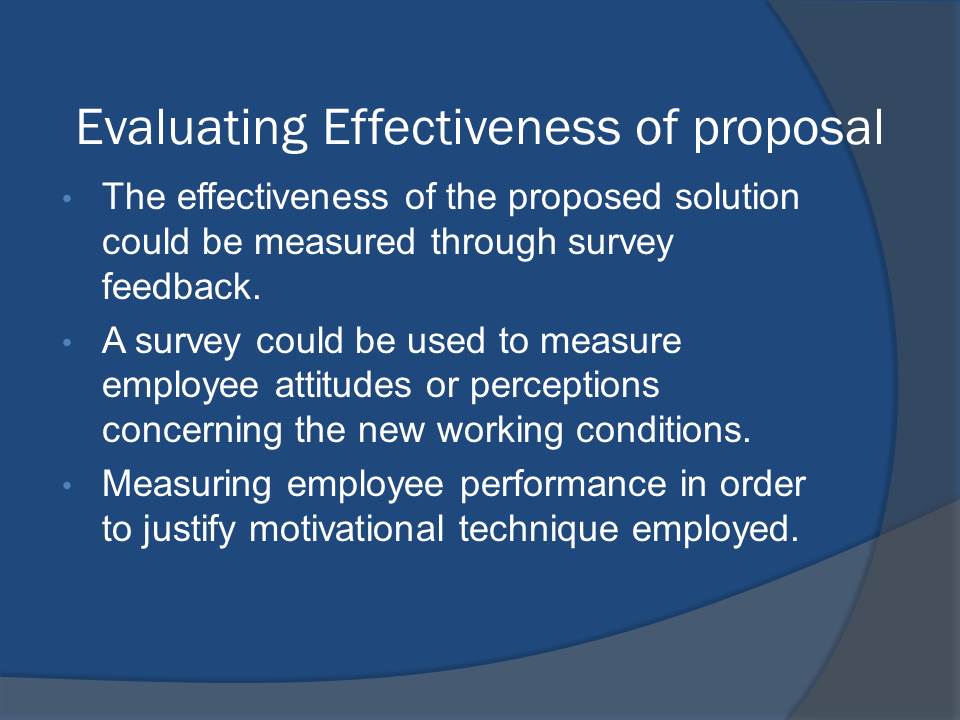
References
Aamodt, M. (2010). Industrial/ Organizatinal Psychology: An applied approach. Belmont, CA: Cengage Learning.
Burke, W. (2010). Organization Change: Theory and Practice. NY: Sage.
Holbeche, L. (2012). Understanding Change. NY: Routledge.
Rucci, A. J. (2008). I-O psychology’s “core purpose”: Where science and practice meet. The Industrial-Organizational Psychologist, 46(1), 17–34.